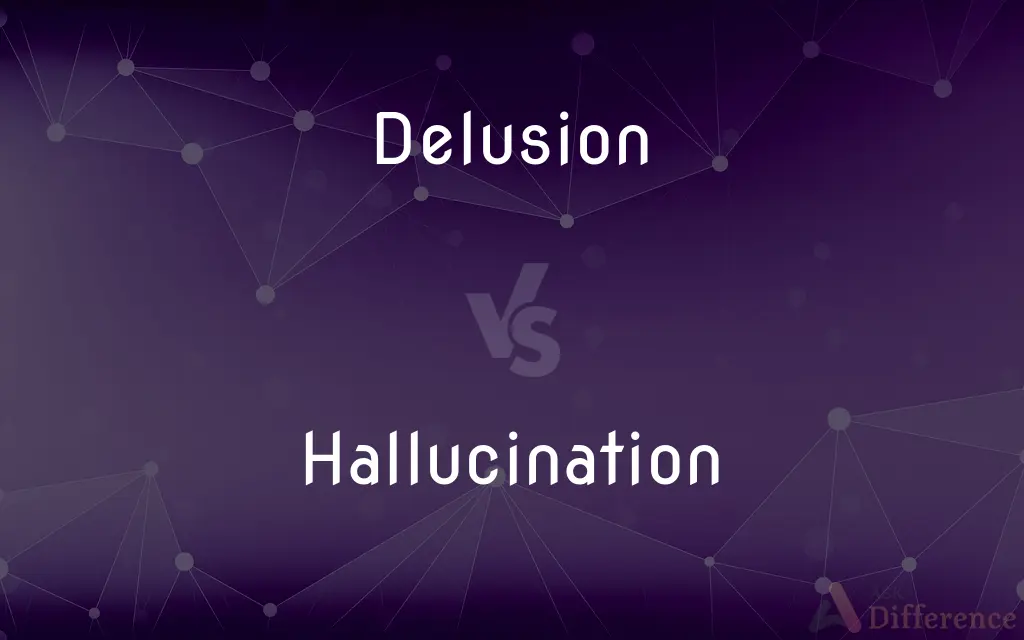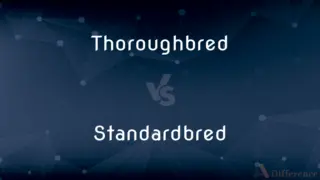Delusion vs. Hallucination — What's the Difference?
By Tayyaba Rehman & Urooj Arif — Updated on March 25, 2024
Delusion involves false beliefs held despite evidence to the contrary, while hallucination is a sensory experience without an external stimulus.

Difference Between Delusion and Hallucination
Table of Contents
ADVERTISEMENT
Key Differences
Delusions are fixed and false beliefs that conflict with reality, even when presented with evidence to the contrary. These beliefs can be about anything but are often of a paranoid or grandiose nature. Hallucinations, on the other hand, are false perceptions in any of the five senses, such as hearing voices that aren't there (auditory hallucinations) or seeing things that do not exist (visual hallucinations). While delusions affect one's belief system, hallucinations impact one's sensory experiences.
Delusions can be categorized into several types, including paranoid, grandiose, and somatic delusions, each reflecting a different false belief about one's power, importance, or the state of one's body. Hallucinations are also diverse, encompassing auditory, visual, olfactory (smell), gustatory (taste), and tactile (touch) experiences, with auditory hallucinations being the most common in psychiatric conditions.
A key distinction between the two is in their nature: delusions are related to cognition and judgment, reflecting a distorted interpretation of reality. Hallucinations, however, are perceptual, arising without any external stimuli and can seem very real to the person experiencing them. This means that a person with delusions will misinterpret or create a false narrative about real events or perceptions, while a person experiencing hallucinations will perceive things that are not actually present.
The treatment and management of delusions and hallucinations can differ, primarily based on their underlying causes, which can range from psychiatric disorders like schizophrenia to neurological conditions or even substance abuse. Delusions often require psychotherapy and medication to address the cognitive distortions and underlying psychiatric conditions. Hallucinations may also be managed with medication, particularly if they are symptoms of a broader psychiatric or neurological condition, but the approach can vary based on the type of hallucination and its impact on the individual.
Understanding the difference between delusions and hallucinations is crucial for diagnosis and treatment in clinical practice. Both are significant symptoms in various mental health disorders, but their management strategies need to be tailored to their specific characteristics and the needs of the individual.
ADVERTISEMENT
Comparison Chart
Nature
Cognitive, related to belief.
Perceptual, related to sensory experience.
Examples
Believing one is being persecuted without basis (paranoia), or that one has extraordinary abilities (grandiosity).
Hearing voices, seeing things, or feeling sensations that aren't there.
Types
Paranoid, grandiose, somatic, etc.
Auditory, visual, olfactory, gustatory, tactile.
Underlying Causes
Psychiatric disorders, brain injury, dementia.
Psychiatric disorders, neurological conditions, substance use.
Treatment
Psychotherapy, medication.
Medication, therapy, addressing underlying causes.
Compare with Definitions
Delusion
Involves firmly held beliefs contrary to reality.
A person might believe they are under constant surveillance without evidence.
Hallucination
Experiencing sounds, sights, or sensations that are not real.
Hearing one's name called when alone.
Delusion
Maintains beliefs despite contradictory evidence.
Insisting on a spouse's infidelity with no factual basis.
Hallucination
Treatment may involve medication and therapy.
Antipsychotics or addressing the root cause like substance withdrawal.
Delusion
Management includes addressing the underlying psychiatric condition.
Antipsychotic medications can help reduce delusional thinking.
Hallucination
Includes auditory, visual, and other sensory hallucinations.
Smelling odors that aren't present.
Delusion
Reflects a distortion in interpreting reality.
Misinterpreting a friendly gesture as a threat.
Hallucination
The experiences are often vivid and perceived as actual occurrences.
Seeing a non-existent person in the room.
Delusion
Can encompass paranoid, grandiose, or somatic themes.
Believing oneself to be a famous figure or possessing unreal abilities.
Hallucination
Seen in psychiatric disorders, neurological conditions, and substance abuse.
Auditory hallucinations are common in schizophrenia.
Delusion
A delusion is a fixed belief that is not amenable to change in light of conflicting evidence. As a pathology, it is distinct from a belief based on false or incomplete information, confabulation, dogma, illusion, or some other misleading effects of perception as individuals with these beliefs are able to change or readjust their beliefs upon viewing the evidence for these beliefs.
Hallucination
A hallucination is a perception in the absence of external stimulus that has qualities of real perceptions. Hallucinations are vivid, substantial, and are perceived to be located in external objective space.
Delusion
An idiosyncratic belief or impression maintained despite being contradicted by reality or rational argument, typically as a symptom of mental disorder
The delusion of being watched
Hallucination
Perception of visual, auditory, tactile, olfactory, or gustatory stimuli in the absence of any external objects or events and with a compelling sense of their reality, resulting from certain mental and physical disorders or as a response to a drug.
Delusion
The act or process of deluding.
Hallucination
The objects or events so perceived.
Delusion
The state of being deluded.
Hallucination
A false or mistaken idea.
Delusion
A false belief or opinion
Labored under the delusion that success was at hand.
Hallucination
A sensory perception of something that does not exist, often arising from disorder of the nervous system, as in delirium tremens.
Delusion
(Psychiatry) A false belief or perception that is a manifestation of a mental illness
Delusions of persecution.
Hallucination
The act of hallucinating; a wandering of the mind; an error, mistake or blunder.
Delusion
A false belief that is resistant to confrontation with actual facts.
Hallucination
(AI) A confident but incorrect response given by an artificial intelligence.
Delusion
The state of being deluded or misled, or process of deluding somebody.
It is far better to grasp the universe as it really is than to persist in delusion, however satisfying and reassuring.
Hallucination
The act of hallucinating; a wandering of the mind; error; mistake; a blunder.
This must have been the hallucination of the transcriber.
Delusion
That which is falsely or delusively believed or propagated; false belief; error in belief.
Hallucination
The perception of objects which have no reality, or of sensations which have no corresponding external cause, arising from disorder of the nervous system, as in delirium tremens; delusion.
Hallucinations are always evidence of cerebral derangement and are common phenomena of insanity.
Delusion
A fixed, false belief, that will not change, despite evidence to the contrary.
Hallucination
Illusory perception; a common symptom of severe mental disorder
Delusion
The act of deluding; deception; a misleading of the mind.
Hallucination
A mistaken or unfounded opinion or idea;
He has delusions of competence
His dreams of vast wealth are a hallucination
Delusion
The state of being deluded or misled.
Hallucination
An object perceived during a hallucinatory episode;
He refused to believe that the angel was a hallucination
Delusion
That which is falsely or delusively believed or propagated; false belief; error in belief.
And fondly mourned the dear delusion gone.
Delusion
(psychology) an erroneous belief that is held in the face of evidence to the contrary
Delusion
A mistaken or unfounded opinion or idea;
He has delusions of competence
His dreams of vast wealth are a hallucination
Delusion
The act of deluding; deception by creating illusory ideas
Common Curiosities
How do you differentiate between delusions and hallucinations?
Delusions are false beliefs held despite evidence to the contrary, while hallucinations are false sensory experiences without an external stimulus.
Are hallucinations only visual?
No, hallucinations can affect any of the senses, including hearing, smell, taste, and touch.
What is the most common type of hallucination in psychiatric conditions?
Auditory hallucinations, such as hearing voices that others do not hear, are the most common type in psychiatric conditions like schizophrenia.
How do medical professionals assess hallucinations?
Health professionals often use interviews, psychological assessments, and sometimes neuroimaging or other medical tests to understand the context and impact of hallucinations on an individual.
What causes delusions?
Delusions can be caused by psychiatric disorders (e.g., schizophrenia), brain injuries, or dementia.
Is it possible to treat delusions and hallucinations?
Yes, both can be treated with medication, psychotherapy, and by addressing their underlying causes, though treatment approaches and effectiveness can vary.
Can a person experience both delusions and hallucinations?
Yes, it's possible for an individual to experience both, especially in conditions like schizophrenia.
Can delusions be positive?
Delusions can sometimes be grandiose or fantastical, leading the individual to believe they have special abilities or are in an exceptionally positive situation, which can be perceived as positive by the individual.
Are delusions always a sign of mental illness?
While delusions are commonly associated with psychiatric disorders, they can also result from neurological conditions, severe stress, or trauma, and do not always signify a chronic mental illness.
Can stress cause hallucinations or delusions?
Yes, severe stress, along with other factors, can contribute to the development of hallucinations or delusions, particularly in individuals predisposed to psychiatric conditions.
Can children experience delusions or hallucinations?
Yes, children can experience both; however, it's important to differentiate between imaginative play and potential signs of a more serious condition, which requires professional evaluation.
What role does medication play in treating hallucinations?
Medication, especially antipsychotic drugs, can play a crucial role in treating hallucinations by targeting the underlying neurochemical imbalances in conditions like schizophrenia.
How can family members help a loved one experiencing delusions?
Family members can offer support by encouraging treatment, providing a stable environment, and avoiding confrontation about the delusional beliefs while seeking professional guidance.
Is it possible to recover from delusions or hallucinations?
Many individuals can experience significant improvement or recovery from delusions and hallucinations with appropriate treatment, which may include medication, psychotherapy, and support for underlying conditions.
Are hallucinations only associated with schizophrenia?
No, hallucinations can be associated with a range of conditions, including migraine headaches, epilepsy, severe depression, and substance use disorders, among others.
Share Your Discovery

Previous Comparison
Thoroughbred vs. Standardbred
Next Comparison
Dish vs. ViandAuthor Spotlight
Written by
Tayyaba RehmanTayyaba Rehman is a distinguished writer, currently serving as a primary contributor to askdifference.com. As a researcher in semantics and etymology, Tayyaba's passion for the complexity of languages and their distinctions has found a perfect home on the platform. Tayyaba delves into the intricacies of language, distinguishing between commonly confused words and phrases, thereby providing clarity for readers worldwide.
Co-written by
Urooj ArifUrooj is a skilled content writer at Ask Difference, known for her exceptional ability to simplify complex topics into engaging and informative content. With a passion for research and a flair for clear, concise writing, she consistently delivers articles that resonate with our diverse audience.














































